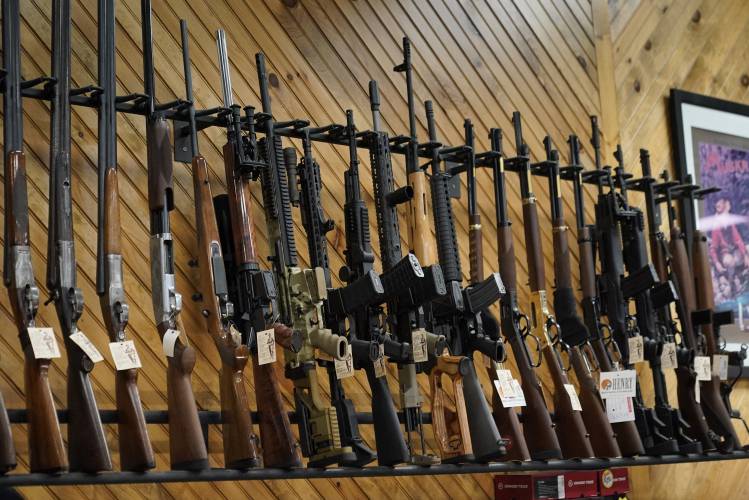Opinion: A conversation on guns and democracy

Various guns are displayed at a store on July 18, 2022, in Auburn, Maine. Robert F. Bukaty/ AP
| Published: 03-02-2024 7:00 AM |
John Buttrick writes from his Vermont Folk Rocker in his Concord home, Minds Crossing. He can be reached at johndbuttrick@gmail.com
Last week I was with a gathering of eight people who had come together to discuss the appropriateness of declaring some gun-free spaces in our society, such as hospitals, schools, and churches. Some of us had never met before that day. There were hand-gun owners, hunting and target gun owners, and people refusing to own a gun; all from white middle class communities. Opinions were diverse and often conflicting but all affirmed feeling a sense of safety, trust, and respect for one another.
The discussion was wide-ranging. Along with the Second Amendment right to bear arms, some expressed a need for guns to control varmints threatening farm crops and hunting for food. There was discussion about the appropriateness of high-capacity automatic gun possession. There was a concern about family protection and preparation for situations of mass shootings. Gun safety was a strong theme: the safe storage of guns, restricting children from access to guns, and comprehensive training in the use of guns.
One person lifted up the need to prepare to deal with the precarious emotional component in a dangerous situation, emotions overtaking the rational assessment, clouding the decision to shoot or not to shoot. The question was floated, does the threat of a weapon deter or escalate a situation, and will meeting threats with reason, empathy, and care be perceived as weakness?
Our discussion about gun possession led to the question, why are there so many guns in our society? I suggest it is because there is a breakdown in the implementation of our democracy. United States democracy today has lost its moorings and the confidence of the people. The actions, or inactions, of our Congress and its relationship with the executive branch no longer invite the trust of the people.
A major issue is money. The media reports that members of Congress stay in office by raising as much money as possible. One of their sources of money is gun manufacturers who discourage any gun control legislation. The more guns they sell the greater the profits. We live in a representative democracy that has chosen to represent the industrial complex, military and otherwise. Katie Porter, a member of Congress, in her campaign for another term identifies money from “federal lobbyists … corporate PAC money … and earmarks” as interfering with representative democracy. This situation leaves citizens with a sense of powerlessness and insecurity. Unable to trust the three branches of government, many citizens have turned to guns for power and safety.
The subject of gun possession generates so many thoughts and feelings. There needs to be many more conversations to generate understanding and identify solutions to the existential epidemic of gun injuries and deaths in our nation. In Congress, the forms of debate and proposed legislation must begin with the belief and commitment to enacting a true democratic representation of the citizenry. At present, many believe that our Congress, executive, and judicial branches are locked into an aristocracy where the only effective voting is with the contributions of large sums of money. The choices offered at the ballot box seem to be the same election after election. There is no longer a perception that voting, writing letters, or visiting the offices of senators and representatives can influence decisions.
The culture of Congress must include the active participation of the citizenry. This may mean giving serious attention to the possible forms of a democratic government and society. David Froomkin, Ian Shapiro, and Robert A. Dahl, writing for Britannica, begin by asking, “How are citizens to govern? What political organizations or institutions will they need? Will these institutions differ between different kinds of associations—for example, a small town and a large country?” They continue, “When citizens are divided on an issue, as they often will be, whose views should prevail, and in what circumstances? Should a majority always prevail, or should minorities sometimes be empowered to block or overcome majority rule?”1.
Article continues after...
Yesterday's Most Read Articles
Another consideration is offered by Merriam Webster dictionary, “The word democracy can refer to … representational government, or it can refer instead to what is also called a direct democracy, in which the citizens themselves participate in the act of governing directly.”
This may seem far afield from seeking solutions to gun control. However, the systemic difficulties the U.S. is having with its brand of flawed democracy has resulted in frustrating citizen participation. Lacking avenues of input into the democratic system, some people are choosing their Second Amendment right to support the possession of firearms for personal power and security. Therefore, it is imperative that we join with Congress to devise a democratic system that once again includes the effective participation of the citizenry. With the power of participatory democracy there may be less felt need for the power of the gun.







 Opinion: Trumpism in a dying democracy
Opinion: Trumpism in a dying democracy Opinion: What Coolidge’s century-old decision can teach us today
Opinion: What Coolidge’s century-old decision can teach us today Opinion: The art of diplomacy
Opinion: The art of diplomacy Opinion: After Roe: Three years of resistance, care and community
Opinion: After Roe: Three years of resistance, care and community
